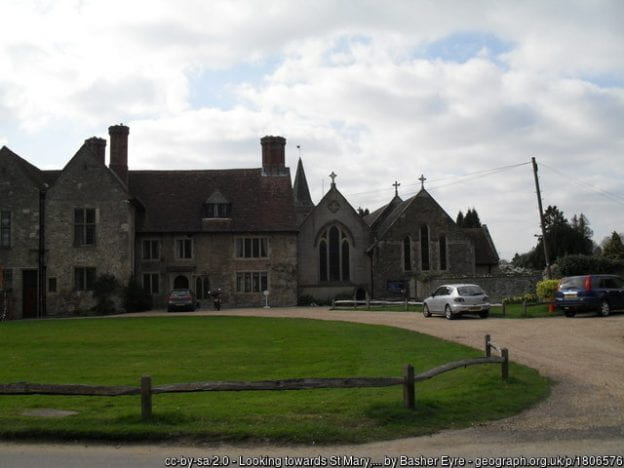Who doesn’t like a nice bit of Year Book/Plea Roll matching? Today’s ‘snap!’ moment comes to you courtesy of the year 1293 and the Common Bench/Court of Common Pleas. It is one which came up in my searches connected with The Prior’s Case (1369) and the interesting borderland between ‘property’ (or ‘feudal’ rights) and covenant/contract. And there are nuns.
YB Trin 21 Edw. 1 pl. 16 (Seipp 1293.217rs) is the case found in the plea roll CP 40/101 m. 32.[i]
It’s a case from Sussex. William de St Georges sued the prioress of Esseburn (Easebourne) to try and enforce their covenant, from ten years previously, made at Todham,[ii] under which she and the nuns of Easebourne were obliged to find suitable chaplains to celebrate divine services in the chapel at Todham before William and his wife and their heirs (number of times per week varying, depending on whether the couple were or were not present), for ever. William said that he had had these services for a short period of time, but after that, the Prioress had refused to do them when asked. There was, in the Year Book, some discussion of whether William had made some errors in his pleading – he had mentioned that he had received the services (been ‘seised of’ them), which sounds closer to the cessavit de cantaria type of action, based on the stopping of ‘feudal’ services previously performed, as opposed to covenant: it does not just rely on ‘you made a covenant that you would provide this service, and you didn’t’. The Year Book suggests that this manner of pleading was somewhat foolish.
The Prioress – or her legal representative – can’t deny that there was a covenant, as it was all formalised nicely, and so settles on a plea of ‘yes we are obliged to find the chaplains but you were supposed to provide ecclesiastical kit – chalice, vestments, missal – and you didn’t’. This was the issue that went to a jury, and the plea roll tells us that the jury found that William had done his duty with regard to the ecclesiastical kit. The final outcome was that the prioress had to perform her covenanted obligations, and William got damages for the non-performance.
Not having looked much at churchy aspects of law in the past, it did strike me as interesting to see litigation in secular courts about the provision of divine services, but I suppose that is anachronistic, seeing these things as clearly separate. Not having somebody to sing mass would, presumably, have involved William in expense, in terms of hiring a substitute. I presume that is what the damages represented, rather than (and admit it, this would have been cooler) a calculation of the amount of spiritual damage done to him and his family by missing out on mass.
It is clear that this was not ‘just’ a contract case: there were land dealings and warranty involved in the William-Priory relationship as well. Teasing out ‘property’ and ‘contractual’ aspects of these cases is not straightforward, and it does look to me as if a not dissimilar deal and relationship lay behind The Prior’s Case, rather complicating it in terms of it really being comparable to modern ‘horizontal’ freehold covenants contexts, or really standing for the legal principles assigned to it. But more of that another time.
GS
20/02/2024
[i] (Even nicer: there is another, connected piece of evidence – a count in Novae Narrationes. See 80 Selden Soc p. 103).
NB the WAALT shows that this was still problematic in 1309: KB 27/195 m. 25d.
[ii] Tuddenham, Suffolk seems closest to this name, but not geographically! Todham seems to be the correct reading: see this account.
